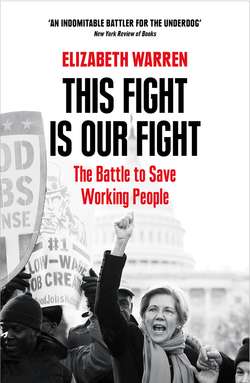Читать книгу This Fight is Our Fight: The Battle to Save Working People - Elizabeth Warren - Страница 22
THE FORGOTTEN RICH MAN
ОглавлениеBut resentments run deep—often really, really deep. Corporate executives and millionaires had gotten richer and richer, but for some of them, Roosevelt’s work to rein in the big banks and break up giant corporations still rankled. It seems that the divine right of kings had translated in the New World into a Divine Right of CEOs. The idea that a democratically elected government could and would curtail their corporate rights was perceived as a threat—and they didn’t like threats. Sure, they were already rich, but that’s the mouth-watering, heart-pumping thing about being rich—it’s better to be even richer. There’s no limit to how rich the rich can be. Besides, any kind of government regulation signaled interference with their deeply held notions of right, wrong, and the undeniable privileges that belonged to them as masters of powerful corporations.
In 1971, the U.S. Chamber of Commerce enlisted a corporate lawyer named Lewis Powell to write a secret memo. As soon as Powell finished his thirty-three-page paper, the chamber, a national organization representing the interests of many of America’s largest corporations, quietly began passing it from one power broker to another. For the CEO crowd, the memo was electrifying. Powell had held nothing back. He forcefully argued that the entire free-enterprise system was under attack—and he called on the super rich to counterattack with all their might.
Powell was an unlikely firebrand. He was mild-mannered, gentlemanly, and unfailingly polite. Many people remarked on his deeply ingrained civility. He was intensely proud of his Virginia roots, which were noticeable in his soft drawl, and he idolized Robert E. Lee. Tall and thin, Powell wore thick glasses and old-fashioned suits. Yet despite all his courtly manners, when it came to defending his corporate clients, he was a take-no-prisoners, shoot-them-all kind of guy.
Powell served on the board of directors for more than a dozen of America’s biggest corporations, and his dedication to advancing the interests of corporate America was legendary. His work for tobacco company Philip Morris included signing off on the company’s annual reports touting the health benefits of cigarettes, and he railed against the press for failing to give adequate credence to the industry’s claims about tobacco safety. He was close personal friends with the top lawyer for General Motors, and when newspaper articles about cars with dangerous designs and product defects began appearing, Powell viewed those stories—and the reporters who wrote them—with alarm. He fervently believed that such challenges undermined people’s confidence in corporate America and put our country right on the slippery slope to socialism.
Many of those who received Powell’s memo shared his view that America’s system of free enterprise was at risk, but it was his call to action that really galvanized his CEO readership. His advice was visionary: Fight back! Reshape Americans’ views about business, government, politics, and law. Fund conservative think tanks. Influence young people by reasserting business interests on college campuses. Pay professors to publish pro-business work. Using example after example, Powell made it clear that he wanted to return America to the pro-corporate, largely unregulated government that, in his view, had served this country so well before the Great Depression.
The beginning of the typewritten Powell Memo, which changed how giant corporations wage political war.
In the darkest days of the Depression, Roosevelt had offered hope to “the forgotten man at the bottom of the economic pyramid.” Without a hint of irony, Powell now spoke tenderly to America’s millionaires: “One does not exaggerate to say that, in terms of political influence with respect to the course of legislation and government action, the American business executive is truly the ‘forgotten man.’”
Rich guys just can’t catch a break.
